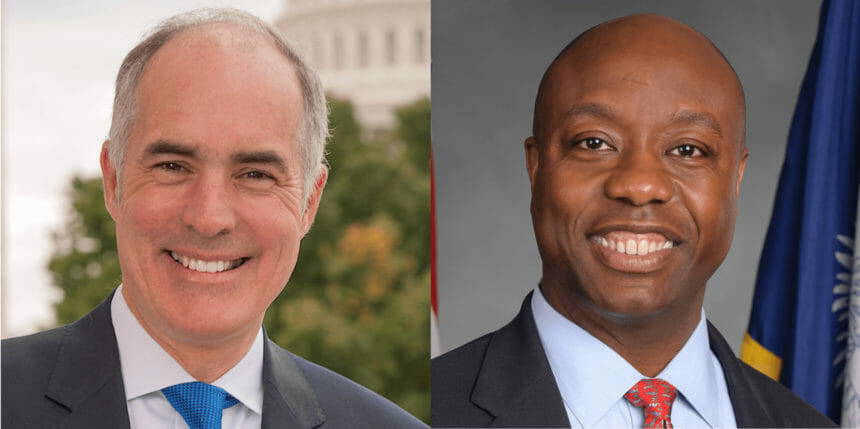

“I’ll just be blunt with you — the federal government hasn’t done nearly enough to help the folks who work in those settings. We’ve got to do a lot more,” Sen. Bob Casey (D-PA) said Monday about the senior living industry.
Casey and Sen. Tim Scott (R-SC) addressed senior living providers via pre-recorded remarks about the upcoming work of the Senate Special Committee on Aging during the first day of Argentum’s 2021 virtual Public Policy Institute. Casey chairs the committee, and Scott is the ranking member.
Calling senior living providers and employees “soldiers in this war against a deadly virus,” Casey said he will work to ensure continued access to essentials such as personal protective equipment, testing and vaccines. He said he is pushing for funding to support a national vaccination strategy to include dollars for education, scheduling, administration and data-reporting.
“Our nation is in crisis, and we need to come together to put this [American Rescue Plan] on President Biden’s desk so he can sign it into law,” said Casey, referring to the $1.9 trillion economic stimulus package proposed by the president.
Casey said he hopes passage is done in a bipartisan fashion. “We’ve got to get it done; we’ve got to get it done fast. I’ll keep fighting battles for you, and for your residents, and for your workers as we continue to deal with this crisis.”
Scott said he is looking forward to the opportunity to “usher in revolutionary changes” to issues that have the biggest and most positive impact on the older adult population.
“Last time I checked, I, too, am aging,” he said. “I’m excited to partner with experts who already understand and appreciate the immense responsibility that comes with being experts for folks who sometimes need a little guidance.”
Samantha Koehler, a senior policy aide from Casey’s office, said that congressional activity, as well as the likely focus of the Senate Committee on Aging, will be on the pandemic response and recovery.
Although the committee still is working on its agenda, Koehler said its priorities are on ensuring that seniors and people with disabilities — as well as those who care for them — have resources to work through the pandemic. Other committee priorities include support for long-term care facilities to protect residents and workers, home- and community-based services, programs to help older adults remain in their homes, and support for the aging network.
Conor Sheehey, deputy legislative director for Scott, said the committee will work on ensuring that Provider Relief Fund dollars “are actually getting out the door, allocated effectively and efficiently” to allow senior living providers to provide vital services and supports on the front lines.
Sheehey said the committee also will leverage lessons learned from the pandemic on the future work of health innovation, particularly in the area of Alzheimer’s disease and dementia. He said the COVID pandemic and the success behind the rapid scale-up of vaccines will inform efforts to substantially invest in and tap public-private partnerships to redouble efforts to “celebrate, advance and move the needle.”
Advocacy

Sen. Joe Manchin (D-WV), chair of the Senate Committee on Energy and Natural Resources and a past member of the Senate Aging Committee, addressed the Public Policy Institute in pre-recorded remarks prior to another session on advocacy.
“We must ensure we are supporting our seniors and those who care for our seniors during this difficult time in the next relief package,” Manchin said, noting that assisted living providers received less than 2% of Provider Relief Funds allocated to healthcare providers.
He said although a proposed $2 billion set-aside for nursing homes, assisted living communities and other long-term care facilities was not included in the COVID relief package proposed at the end of last year, he is committed to continuing to support older adults and those who care for them.
“I am committed to working in a bipartisan manner to further address the urgent needs of our seniors through additional funding and flexibility,” Manchin said. “As we see the light at the end of this health crisis, we must continue to work together to pass legislative policies that ensure seniors and assisted living providers get their fair share of federal funding.”
Industry needs
In a session with the media, Argentum President and CEO James Balda said that, unlike hospitals and other healthcare providers who faced a crisis early in the pandemic, senior living communities face a compounding impact month after month.
Last year alone, Balda said, the industry experienced $15 billion in losses due to increased expenses from PPE, testing and “hero pay,” as well as revenue losses due to occupancy pressures.
“Those pressures compound month after month,” he said, renewing a call for $5 billion in targeted funding to help the senior living industry fight the pandemic on the front lines.
Pat Mulloy, chairman of the Argentum Board of Directors, called it a “crime” that the Department of Health and Human Services has yet to allocate more than $25 billion from the Provider Relief Fund.
“We need funding, and it’s not a handout,” Mulloy said. “It’s to protect the 2 million Americans that call senior housing their homes.”
Brenda Bacon, president and CEO of Mt. Laurel, NJ-based Brandywine Living, said it’s in the interest of every taxpayer that the senior living industry survive. The private-pay model of assisted living, she said, relieves the pressures on the Medicare and Medicaid programs. If the industry does not survive, Bacon said, people will have no choice but to access institutional care using those avenues of funding.
“We need to continue to do a better job of making people aware that every taxpayer benefits from our industry,” she said.


